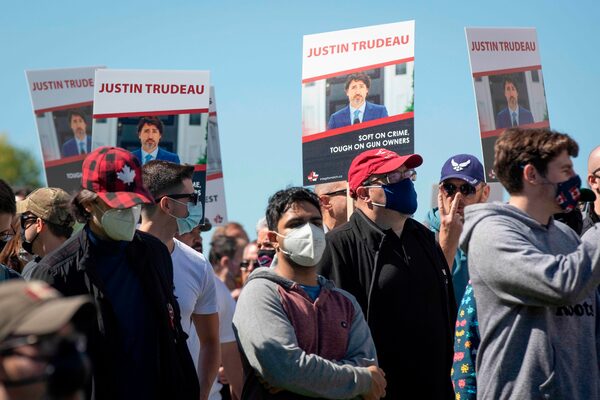
Gun supporters hold signs on Parliament Hill before the Canadian Coalition for Firearm Rights pro gun march in Ottawa on Sept. 12, 2020.LARS HAGBERG/AFP/Getty Images
For a federal government that will fall over itself in deference to provincial jurisdiction when questioned on, say, a law that bans people from working certain public-sector jobs because of what they wear, it is noteworthy that Ottawa apparently has no qualms venturing into provincial jurisdiction to allow municipalities to ban handguns within their city limits. Systemic discrimination is a provincial matter, but municipal governance is … a federal one? Have I got that right?
Perhaps my error here is in trying to make sense of this government’s enduringly nonsensical and ideologically driven approach to gun control. In May, Ottawa enacted what it called a ban on “military-style assault rifles,” an invented descriptor, which it misleadingly sold as a total prohibition on the deadliest of firearms. In fact, the Order in Council merely and rather arbitrarily expanded the list of prohibited weapons in Canada, while leaving plenty of similar semi-automatic weapons perfectly legal (the deadliest guns – fully automatic firearms – have been prohibited in Canada for decades). The move was made in the wake of the horrific massacre in Nova Scotia in April, although the firearms used by the shooter in that deadly attack were obtained illegally.
The federal government’s pending move to allow municipalities to ban handguns is at least more targeted to the types of firearms most often used in violent crimes. Indeed, since 2009, Statistics Canada data show that around six in 10 firearms-related violent crimes in Canada involved handguns, and more than two-thirds in urban areas involved handguns. But that’s about where the evidence backing this sort of measure ends.
Ottawa has promoted plans for a municipal handgun ban as a way to empower cities to make urban spaces safer. But any civilian walking around a city carrying a handgun, which is classified as a restricted weapon, is already breaking the law in Canada. Our gun laws are such that handguns may only be transported unloaded, outfitted with a trigger lock, in an opaque case and with an Authorization to Transport (ATT) between certain locations such as an owner’s home and a registered shooting range. Anything else is already against the law in Canada, even if the handgun was legally purchased and carried by someone with a Restricted Possession and Acquisition Licence (RPAL).
A municipal ban on handguns, therefore, would only serve to make the limited activities permissible for those with RPALs (which is essentially just owning handguns and shooting at approved ranges) against the law, as well as prohibit their sale within city limits. But it would not affect the behaviour of those using handguns in violent crimes – or even just walking down the street with a handgun – since both are already illegal in Canada.
The goal here might be to reduce the overall supply of handguns in Canada, which may theoretically be possible with actual comprehensive gun-control measures: a national handgun ban to prevent legally purchased guns from ending up in the wrong hands, combined with massively enhanced border control measures to stem the flow of guns from the United States, for example. Yet this government has no plans for a national ban, since, according to a spokesperson for Public Safety Minister Bill Blair, “communities across Canada do not all experience gun violence in a single unified manner.”
A patchwork of municipal bans, however, is merely gun-control theatre: Enforcement would be nearly impossible, especially in cities without their own police forces, and the move would likely just move legal gun activities to neighbouring municipalities (that is, if municipalities decide to adopt a ban at all; mayors of cities including Toronto, St. John’s and Mississauga have expressed skepticism about the idea, and Ontario, Alberta and Saskatchewan have outright rejected it) Existing RPAL owners would have to be grandfathered in to the new regulatory scheme, and those using handguns illegally would continue just as they always have: ignoring the law.
The reality is that without a massive investment in shoring up border controls, domestic efforts to control gun crime in Canada will be futile. The government has committed $51.5-million over five years to prevent smuggling of firearms into Canada, but considering border agents seized just 753 firearms last year (Toronto police seized more handguns alone in 2018), and considering that Statscan is only now starting to compile national data on the origins of guns used in crimes (in 2018, Toronto police tied 70 per cent of guns for which origins could be traced back to the U.S.), a municipal handgun ban looks like a totally irrelevant “solution” to a problem it doesn’t materially address.
This is, of course, par for the course for a government whose approach to gun control is invariably more about perception than reality. Having already banned an invented category of deadly weapons, Ottawa will now allow cities to create invisible borders for prohibited weapons, mostly to render already illegal activities ... extra-illegal. Do you feel safer yet?
Keep your Opinions sharp and informed. Get the Opinion newsletter. Sign up today.
 Robyn Urback
Robyn Urback